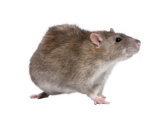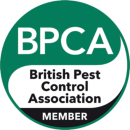
The milder winters we are experiencing in the UK spell increasing problems with pests say experts, and in particular rats and mice.
Pest control companies across England, Wales and Scotland are reporting record numbers of call-outs for rodents, which head indoors in the colder months as they seek shelter. And with rats sexually mature in just three months and able to produce up to a dozen litters of between six and eight young each time in their two-year lifespan, this has led to an explosion in numbers.
“Winter is the time of year when we come into contact with rodents the most,” says Gareth Purnell of leading pest control company Pest Professionals.
“The rats are looking for an easy source of food, warmth, shelter and water and our homes are more attractive to them than the sewer! They are very good climbers and if they find a nearby source of food and can gain access to loft spaces or garages nearby. These can make ideal homes for them.”
So what, if anything, can householders do to prevent rats and mice setting up home near to you?
“Firstly, do not give them an easy food source. In particular we see rat populations explode near to where people leave out a lot of bird food, especially if it’s on the ground,” adds Gareth. “Proofing can also be very important, although it can be challenging with some properties. There are various rodent proof products we use for this depending on what we are faced with.”
Once they set up home, rodents can cause a lot of damage very quickly. They have to gnaw because their incisor teeth have no roots and keep growing throughout their life – the gnawing stops their teeth ‘over-growing’. Because of this they will quickly damage anything you have in the loft beyond repair.
“Also rats have no bladder control and will soon spoil anything they are regularly moving across. Perhaps most alarmingly, they frequently love to gnaw away at wiring and they are a serious fire hazard. It’s not because they are especially attracted to the electricity, as some people believe. It’s more likely because they come across a small hole already drilled for the wiring, and figure that they can easily make it bigger to get through.”
Rodents are believed to cause a huge number of house fires every year for this reason. And rats carry many nasty diseases which they can spread to humans, normally through their urine including; Leptospirosis or Weil’s disease, Salmonella, Listeria, Toxoplasma gondii and Hantavirus. If you have rats you are obliged to do something about it and it’s advisable to call a qualified pest controller who is experienced in dealing with the problem in domestic properties.
Many people initially try to get rid of rats and mice themselves, before giving up and getting a professional pest controller involved.
“The most common mistake we see is people putting poison down inside the property. This may well kill some of the rats, but they are extremely likely to die in the wall cavities or under the floor boards. This creates two very unpleasant problems,” says RSPH Level II qualified pest controller Colin Campbell.
“Firstly the dead rat rots, creating a horrible, sickly-sweet smell throughout the house that commonly lasts several weeks. Secondly you will often get flies ‘blowing’ on the carcass, so a few days after the rat dies, the house will fill up with flies. And until all the flesh has been eaten by the maggots, that will keep happening.”
Pest Professionals is a member of the British Pest Control Association (BPCA) and operates a guaranteed two or three step approach to solving domestic rodent issues. Each property is different and the operatives will consult with you to explain their recommended approach.
“With rats, if they are inside the house, we usually look to trap them, while at the same time proofing against them coming back in,” adds Colin. “We generally only recommend using rodenticide in tamper proof boxes outside. The key is to get rid of the existing population, and stop a new ones coming in.”
GOT A RODENT PROBLEM?
CALL THE PEST PROFESSIONALS ON 0800 275 1000






































